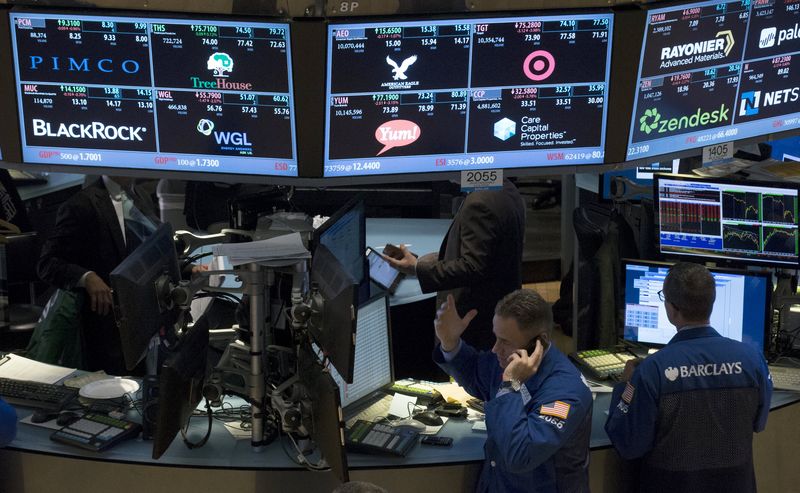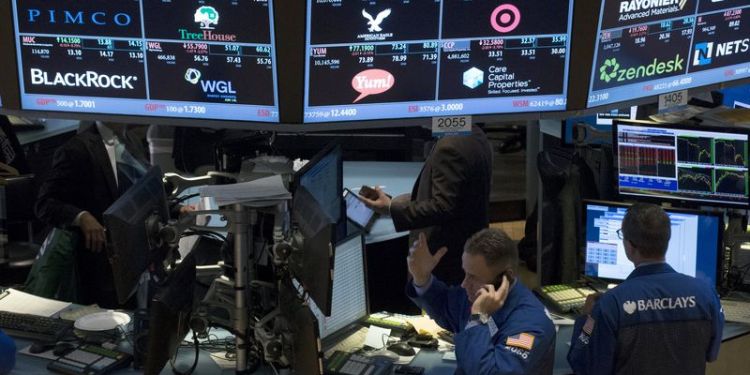
© Reuters.
By Geoffrey Smith
Investing.com — The U.S. publishes its latest report on job openings and labor turnover, along with another update on consumer confidence and house prices. Those numbers will test the strength of a premarket rebound in U.S. stocks, as the market adjusts to the hawkish message from the Federal Reserve’s Jackson Hole meeting. Inflation data for August start to dribble out in the Eurozone, ahead of the European Central Bank’s meeting on Thursday. Exxon threatens Russia with legal action over its biggest project in the country, and the American Petroleum Institute updates on U.S. demand for oil and gasoline. Here’s what you need to know in financial markets on Tuesday, August 30.
1. JOLTS, CB consumer confidence and house prices due
The Labor Department publishes its Job Openings and Labor Turnover Survey for July, casting fresh light on the strength of the jobs market.
Recent jobless claims data since the end of July have suggested that the economy is still quite strong enough to allow the newly laid off to find work almost immediately. The ratio of vacancies to people unemployed is still at historically high levels. All the same, any sharp drop in the number of new job openings being posted is likely to ring some alarm bells.
The JOLTS is due at 10:00 ET (14:00 GMT) along with the Conference Board’s consumer confidence survey. Before that, at 09:00 ET, S&P’s monthly numbers on house prices will show how fast the Fed’s monetary policy tightening is working on the housing market. The New York Fed’s President John Williams also speaks at 11:00 ET
2. Tentative signs of Eurozone inflation peaking ahead of ECB meeting
The annual rate of inflation in the Eurozone’s largest economy looks to have risen further in August, as food and services prices, coupled with much higher gas and electricity bills, offset the drop in gasoline and diesel prices.
Data from a handful of Germany’s biggest federal states suggest the national rate may have topped 8% last month, analysts said, even though the monthly price dynamic weakened considerably. A preliminary figure is due from Destatis at 08:00 ET. Earlier, Spain – the Eurozone’s fourth-biggest economy – said prices rose less than expected last month, by only 0.1%, bringing the annual rate down to 10.4% from 10.8%.
The euro rose half a percent against the dollar to $1.0047 as participants gave a little more credence to reports of a possible 75 basis point increase in interest rates when the European Central Bank’s governing council meets on Thursday.
3. Stocks set for a bounce at open, Pinduoduo surges
U.S. stocks are set to rebound at the opening, having adjusted to the (not very big) shock of Fed Chair Jerome Powell repeating on Friday that the central bank will keep on raising rates until inflation is defeated.
By 06:20 ET, Dow Jones futures were up 225 points, or 0.7%, while S&P 500 futures were up 0.9%, and Nasdaq 100 futures were up 1.1%.
Stocks likely to be in focus later include Pinduoduo (NASDAQ:PDD), after the Chinese e-commerce company blew past expectations with its quarterly earnings. There’ll also be heightened attention on Digital World Acquisition Corp (NASDAQ:DWAC), as a deadline extension to its merger with Donald Trump’s social media company suggested the deal may not go through.
Chinese search giant Baidu (NASDAQ:BIDU), Big Lots (NYSE:BIG), and Futu (NASDAQ:FUTU) all report earnings.
4. Exxon threatens Russia as Ukrainian counteroffensive begins
Exxon Mobil (NYSE:XOM) has told Russia it will sue unless Moscow allows the company to exit its biggest remaining project in the country, Sakhalin-1, The Wall Street Journal reported.
The company has already cut output from the offshore project off Russia’s far east coast to around 10,000 barrels a day, from over 200,000 b/d at its peak.
In separate but indirectly related news, Ukraine’s armed forces launched a counteroffensive in the southern region of Kherson on Monday, in a sign that the initiative on the battlefield has shifted after six months of Russian offensives ground to a halt.
5. Oil falls as demand concerns regain the upper hand; API due
Crude oil prices fell overnight as fears about demand destruction from the global economic slowdown once again came to the fore.
That neutralized Monday’s rally on the back of political violence in Iraq, which cast doubt on supplies from OPEC’s second-biggest producing member, and also overshadowed a report in the newspaper Kommersant suggesting that Russia’s oil and condensate output fell by 2% in August.
The American Petroleum Institute updates on U.S. crude and product stocks at 16:30 ET as usual, and a modest 600,000 barrel drop in crude inventories is expected.
U.S. crude futures were down 1.8% at $95.27 a barrel, while Brent was down 2.0% at $100.86 a barrel.
Source: Investing.com





























